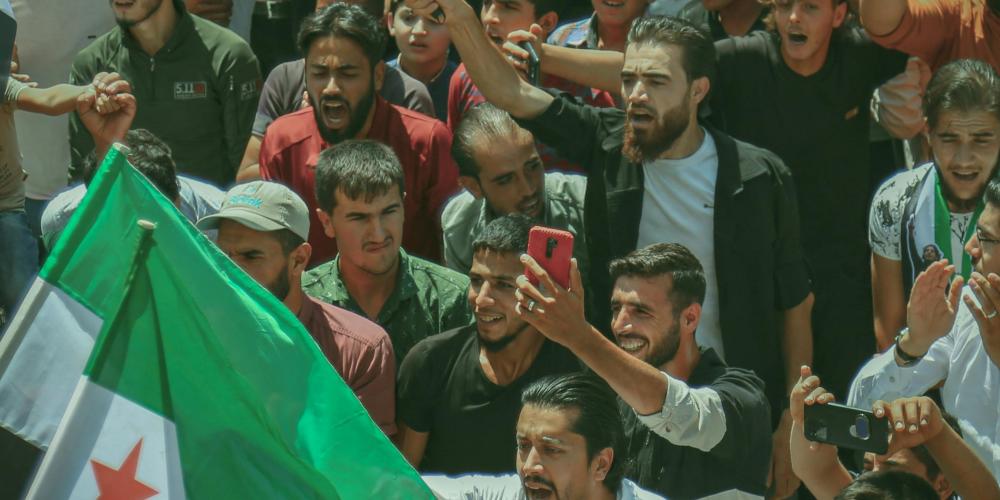
On New Year’s Day, almost a month after the fall of the Assad regime, Tamara, a well-known Syrian activist, posted a photo of herself in Damascus with the caption: “Finally home again.” It’s still hard to fathom how, after 13 years of war, the country has changed so drastically in just a few days. I see countless posts like Tamara’s from Damascus—Syrians with tears in their eyes. Even a month later, optimism remains the dominant emotion.
That doesn’t mean there’s a lack of realism. Activists are closely watching every move of the new leader, Ahmed al-Sharaa. Every misstep he takes, every questionable appointment, is met with sharp criticism. Others urge patience. Some highlight al-Sharaa’s attempts—despite his past as a former al-Qaeda member—to protect minorities, while others have little faith in the new policies of his HTS militia.
Divided Experiences
There’s also a noticeable divide between Syrians who fled the country for political reasons and those who were forced to stay behind. The latter group is mainly relieved to finally be free—able to speak their minds without fear of arrest or torture. Returning refugees, however, want to ensure Syria becomes a democratic nation for all its citizens. It’s a classic divide.
The bigger question is: how long will the honeymoon period last for al-Sharaa and HTS? Every revolution—from the French to the Sudanese—has its honeymoon phase. Initially, people feel united and joyful, overlooking hardships and flaws. For instance, people in Damascus aren’t yet complaining about having electricity for only a few hours a day or about HTS’s failure to fix it. Hunger, too, is still being endured with patience. But there will come a time when frustration grows, and people demand improvements. If those demands go unmet, al-Sharaa and HTS will quickly lose their legitimacy, and the chances of new conflicts will rise.
Chaos or Dictatorship?
This is something the European Union should understand. Our continent has experienced its share of revolutions and democratic transitions. After the fall of the Iron Curtain in 1989, the situation was no different. Over two decades, Central and Eastern European governments were relentlessly punished at the ballot box for failing to meet idealistic expectations. History has taught us—from transitions in Latin America, Africa, and the Middle East—that without international support, fledgling democracies often descend back into chaos or dictatorship.
This is why Europe’s response since the fall of Assad on December 8, 2024, has been disappointing. Just one day later, several European countries announced they would halt asylum procedures for Syrians. Meanwhile, sanctions against Syria were not lifted, and HTS was not removed from the list of terrorist organisations. Isn’t that contradictory? If you believe the country is run by terrorists, why stop asylum procedures for those fleeing terrorism?
What Are ‘European Values’?
Eventually, the EU decided to send the foreign ministers of its two largest member states, Germany and France, to Syria to meet with the new leader. Their message could hardly have been worse. They declared that European policy on Syria, including sanctions, would only change if guarantees were provided for the protection of religious minorities, women, and Kurds—and if there was no conservative Islamic governance.
But when will Europe decide that these requirements have been met? In a few months? A few years? Based on what report? A Syrian cynically asked me why Germany refuses to support Islamic governance in Syria yet trades with Saudi Arabia—or worse, remains silent on the genocide in Gaza. In short, what are these “European values”? The sanctions were imposed on Bashar al-Assad for murdering his own people, not because Syria failed to resemble a Scandinavian utopia. The United States has already understood this and has partially lifted sanctions. Why hasn’t Europe?
Learning From Past Mistakes
Europe is repeating its mistake in Libya, where it waited far too long to get involved. The result? Militias and political groups received support from competing countries, leading to the civil war that began in 2013 and continues to this day. France and Italy bear some responsibility for this.
In Sudan, too, international hesitation contributed to renewed conflict. Isn’t it time we learned from these disasters?
A ‘Friends of Syria’ Revival
The EU still holds an important lever. In 2012, at France’s initiative, it founded the “Friends of Syria” organisation. That December, representatives from 114 countries attended a meeting in Marrakech.
The best step the EU can take now is to reconvene the Friends of Syria to develop and fund a reconstruction plan for Syria. A unified approach would prevent favouritism towards specific groups or militias and would expedite making Syria a livable country again. Offering refugees a home or apartment upon their return would be a powerful incentive. Right now, the country is a wreck.
While the signs from Syria are positive, the situation remains incredibly fragile. We can choose to wait and see if everything aligns with “European values.” And if it falls apart, we can shrug, shake our heads, and say it was never going to work with those former jihadists.
Or we can act now—helping rebuild the country politically and materially, ensuring all groups are included in the process. There are no guarantees it will succeed, but after years of suffering, isn’t it worth trying?*
*This is a machine translation. We apologise for any inaccuracies.